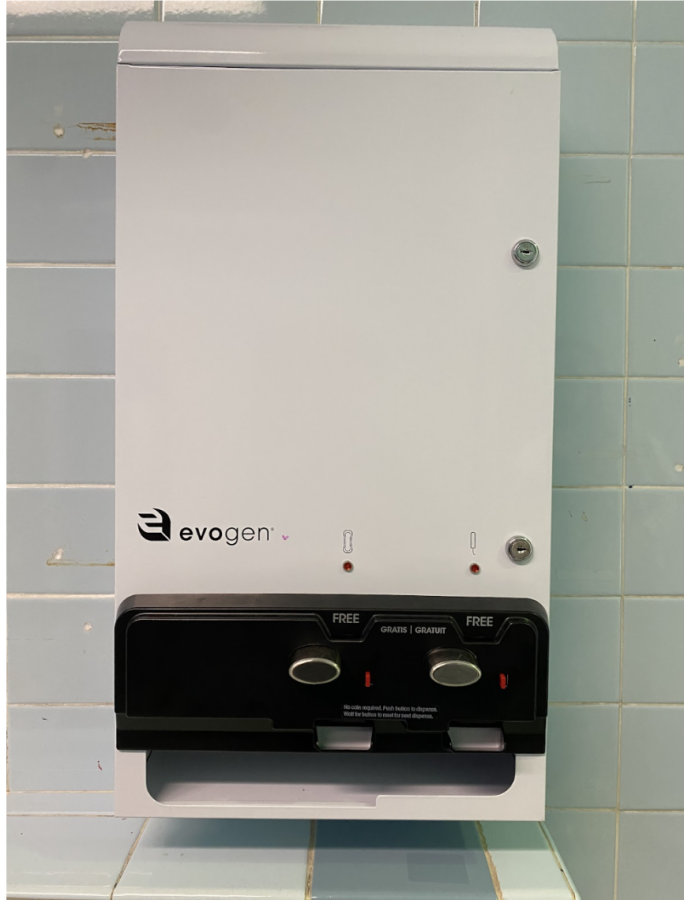It’s perfectly normal: Breaking the period stigma
It’s official; as of October first, at least two sanitary dispensers are required in all Maryland public school female restrooms.
House bill 205 in the state of Maryland titled: Public Schools – Provision of Menstrual Hygiene Products, states that it is making it a requirement for every public school to provide free menstrual hygiene products via dispensers in at least two womens restrooms by October 1, 2022. It also says that by August 1, 2025, all women’s bathrooms should acquire a dispenser.
Centennial principal Cynthia Dillon elaborates,“the custodial supervisors were working with all the schools to make sure that they were installed and that they were there for students to use…. And just like the toilet paper and the soap, it is replenished.”
Dillon detailed an account of a student at Centennial High School who was planning on putting period products into bathrooms herself until the bill was passed. “I had been working with [a student at Centennial] who had- through social media -been saying ‘if anybody needs tampons or pads come find me/message me and I’ll come give it to you’.” Dillon continues to explain that the girl even purchased baskets and products to put into the bathrooms. “I didn’t know that was going to happen or I would have stopped her, [but] I think it’s nice that there was a classmate that saw the same need as a legislature did.”
Dillon acknowledges her appreciation for the bill, stating she didn’t have the same opportunities when she was a kid, and understands how challenging it can be. “I couldn’t get anything from high school, like not even pads…and so it’s puzzling when this is a basic need; why wouldn’t you just help me out, I’m a kid right?”
While sanitary products are now much more accessible to women across the US, it is still important to recognize that many places in the world don’t have the same access to these items as Americans. The former Girl for Girl club, along with a few other clubs, use their privilege to help others around the world. “Some clubs on a regular basis collect menstrual items to send to third world countries where they don’t have access,” Dillon explains, “when you think about the fact that now you’re getting what you need for free and there are places in the world where they can’t get them at all, even for a cost, that’s a hard thing to wrap your head around, and you need to be thankful that there is someone out there advocating for women’s health issues.”
A large issue for those who cannot afford menstrual products is that period problems are not covered by food stamps. In order to combat this, Katherine Parker, the women’s studies teacher at Centennial, says that the Girl for Girl club used to donate money to organizations in the county and the state of Maryland that will collect the products and redistribute them. Unfortunately, this club is no longer running at Centennial; however, there is a club that advocates in a similar fashion.
Junior Zoomel Ghauri is the vice president of Girl Up, a club similar to the Girl for Girl club. Girl Up advocates for women’s rights by participating in period drives, attending presentations about domestic violence against women, and taking part in the annual Girl Up summit. The summit takes place in DC, and is an opportunity for “Girl Up leaders and changemakers in the DMV region to be a force for social good,” Ghauri states. She continues to say that “the atmosphere in Girl Up is so inclusive and fun. It doesn’t feel like I’m just sitting through another class: I’m contributing to something that takes a real initiative to strive for change in women’s roles in society.” Ghauri was glad to see that sanitary dispensers had been added in a few of the bathrooms, because of how essential they are to every person in need of a sanitary item, stating that “they’re important to add in[to] schools because they need to be normalized. A lot of people, especially guys, get uncomfortable with the sounds of these products, but there’s nothing uncomfortable about such a natural occurrence.”
Girl Up’s motto is “when girls rise, we all rise,” which seems to resonate with women throughout the school, who also feel the addition to the bathrooms was necessary. Just like Ghauri, sophomore Natalia Kasamon says she is thrilled that they were added to the bathrooms and thinks that “it’s really great because I don’t think we should be paying for them.” Since they are necessary for all women, just like other hygiene products such as toilet paper, pads and tampons should be free and provided in all schools.
“I don’t see a need to hide something all girls can connect and help each other with, if anything, we should be more than educated on this topic” Ghauri concludes.
nc/jy/ac/rm/ew
For more breaking news and photos, follow The Wingspan on Instagram and Twitter @CHSWingspan.






